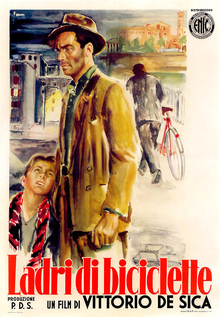Bicycle Thieves
| Bicycle Thieves | |
|---|---|

Italian theatrical release poster
|
|
| Directed by | Vittorio De Sica |
| Produced by | P.D.S.: Produzioni De Sica (with finance from Ercole Graziadei, Sergio Bernardi, Count Cicogna) |
| Screenplay by |
Vittorio De Sica Cesare Zavattini Suso Cecchi d'Amico Gerardo Guerrieri Oreste Biancoli Adolfo Franci |
| Story by | Luigi Bartolini |
| Starring | |
| Music by | Alessandro Cicognini |
| Cinematography | Carlo Montuori |
| Edited by | Eraldo Da Roma |
| Distributed by | Ente Nazionale Industrie Cinematografiche Joseph Burstyn & Arthur Mayer (US) |
|
Release date
|
|
|
Running time
|
93 minutes |
| Country | Italy |
| Language | Italian |
| Budget | $81,000 or $133,000 |
| Box office | $371,111 (domestic gross) |
Bicycle Thieves (Italian: Ladri di biciclette; sometimes known in the United States as The Bicycle Thief) is a 1948 Italian film directed by Vittorio De Sica. The film follows the story of a poor father searching post-World War II Rome for his stolen bicycle, without which he will lose the job which was to be the salvation of his young family.
Adapted for the screen by Cesare Zavattini from a novel by Luigi Bartolini, and starring Lamberto Maggiorani as the desperate father and Enzo Staiola as his plucky young son, Bicycle Thieves is widely regarded as a masterpiece of Italian neorealism. It received an Academy Honorary Award in 1950 and, just four years after its release, was deemed the greatest film of all time by Sight & Sound magazine's poll of filmmakers and critics; fifty years later the same poll ranked it sixth among greatest-ever films. It is also one of the top ten among the British Film Institute's list of films you should see by the age of 14.
In the post-World War II Val Melaina neighbourhood of Rome, Antonio Ricci (Lamberto Maggiorani) is desperate for work to support his wife Maria (Lianella Carell), his son Bruno (Enzo Staiola), and his small baby. He is offered a position posting advertising bills, but tells Maria that he cannot accept because the job requires a bicycle. Maria resolutely strips the bed of her dowry bedsheets—
...
Wikipedia
